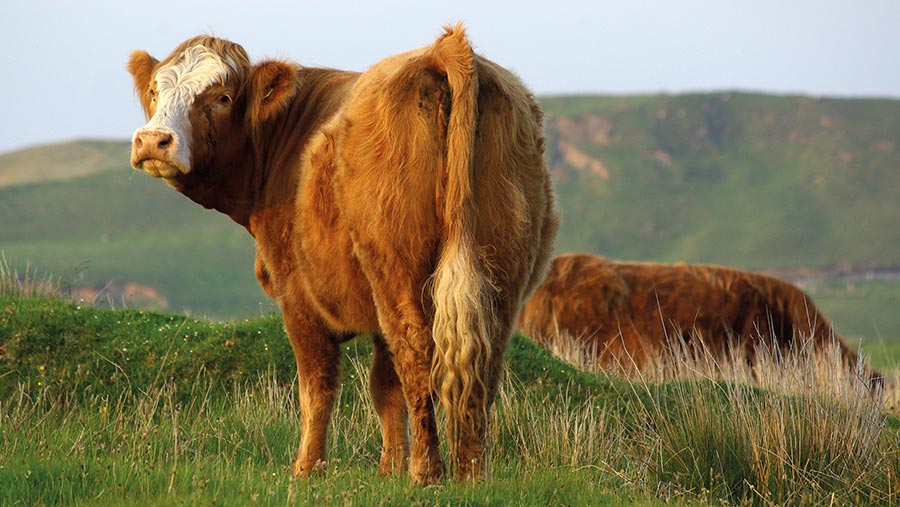Scotland’s first minister pledges ongoing support for livestock farmers
 © Natalia Sidorova/Adobe Stock
© Natalia Sidorova/Adobe Stock Scotland’s first minister, Humza Yousaf, has pledged his ongoing support for livestock production, recognising the vital role of grazing livestock in a sustainable farming system to support a vibrant agricultural sector.
Mr Yousaf MSP addressed more than 400 delegates at the NFU Scotland (NFUS) conference in Glasgow on Friday 9 February where he was joined by rural affairs secretary Mairi Gougeon.
He told farmers that the Scottish government will endorse at least the retention, if not the expansion of livestock production in Scotland, but with the added caveat that the sector must work with government to find ways to reduce its carbon emissions.
See also: NFU Scotland demands immediate reinstatement of ‘lost’ £61m
“The Scottish government will continue to support beef production, but we need to reduce carbon emissions. But support for production will come with conditions… we will co-design that policy with you,” said Mr Yousaf.
The minister’s support for the beef industry and livestock production was well received by farmers in the audience, many of whom run beef and sheep farming enterprises.
Some 85% of the farmed area in Scotland is classified as Less Favoured Area (LFA), where livestock production is essential to farmers and crofters’ livelihoods.
On food production, Mr Yousaf pledged: “I don’t want us to be producing any less food. I want us to be producing more good quality Scottish food. Maintaining food production is at the very heart of our agricultural policy.”
Westminster budget uncertainty
Mr Yousaf also sought to give delegates some certainty over future farming funding, amid continuing uncertainty from the Westminster government about support levels for agriculture beyond the life of this parliament.
He said BPS payments would be paid to Scottish farmers from early September, as they were in 2023.
The Scottish government plans to end BPS payments in 2026 and introduce a new four-tier farm support scheme in 2027, which will see funding split into four tiers with conditionality attached to farmers receiving payments.
Mr Yousaf pledged that at least 70% of future rural funding will be paid to farmers directly in tiers 1 and 2 of the new farm support scheme.
in addition, funding for the replacement for the Less Favoured Areas Support Scheme (LFASS), currently worth £65m, will be made available through Tier 2 once the replacement scheme has been decided. An extra 10% of the budget, on top of the 70%, will likely be allocated to support LFAs.
The remainder of the funding, in tiers 3 and 4, will pay farmers for targeted actions for climate change and nature restoration, such as tree planting, creating wetlands or restoring peatlands.
Mr Yousaf said he wanted to avoid a funding cliff edge for farmers and move towards a “just transition”.
But he added that farmers “are expected to deliver more for nature and climate” in exchange for this funding.
NFUS president Martin Kennedy responded by saying: “There is no one greener than Scottish farmers.”
Mr Yousaf expressed his frustration that neither the Conservative government nor Labour had made any commitments over the future farming budget for the UK agriculture beyond the life of this parliament.
He said this information will only become clear with the outcome of the general election this year and likelihood of a new Labour government.
‘Lost’ £61m will be returned
Both Mr Yousaf and Ms Gougeon promised that the full amount of £61m of deferred convergence funding will all be returned to the Scottish agricultural budget.
Ms Gougeon has already announced the return of £15m of this money in the 2024-25 farming budget.
One farmer in the audience told Mr Yousaf the Bute House Agreement has been a disaster for Scottish farming, pointing to farmer protests “from Ballater to Berlin” about the green agenda.
The first minister refused to scrap the agreement – a power sharing agreement between the ruling SNP and Scottish Greens to “build a greener, fairer and independent Scotland” – but said he would at least review it.
Species reintroduction of sea eagles and beavers is having a big impact on some areas of farming and crofting in Scotland.
Farmers in some areas have reported damage to crops, trees and river banks caused by beavers where they have been reintroduced for flood defences.
There is also mounting concern among crofters about the impact of reintroducing beavers in the Cairngorms National Park.
Beavers and sea eagles
On the reintroduction of beavers, Mr Yousaf said: “We need to be really alive to the unintended consequences of our policy.”
Ms Gougeon said later this year the Scottish government will also launch a review into the impact of sea eagles on the farming sector, amid reports they are killing lambs.
Speaking afterwards to Farmers Weekly, Ms Gougeon said:
“The first minister made a number of announcements today that I hope will be positively received, I think around supporting our livestock industry going forward, recognising how vital that is for us as a nation, our economy and our exports.
“There was the recognition of how important food production is in Scotland, but also he sets that challenge that, of course, we want continue to produce food and to support that, but we have got to do it in a way that lowers our emissions and enhances biodiversity.”
NFUS verdict
Responding to the announcements, NFUS vice-president Alasdair Macnab said: “We welcome the first minister’s commitment on funding. It’s something the farming industry has been desperate for.
“The industry needs direction and to receive the confidence that the support will be there. We don’t know what the future farming budget from Westminster will be and we won’t know that until the outcome of the general election.
“None of the political parties are really committing on the overall budget. All the UK farming unions are asking for an extra £1bn in support for the annual agricultural budget, that would see at least another £170m go into the Scottish agricultural budget.”
